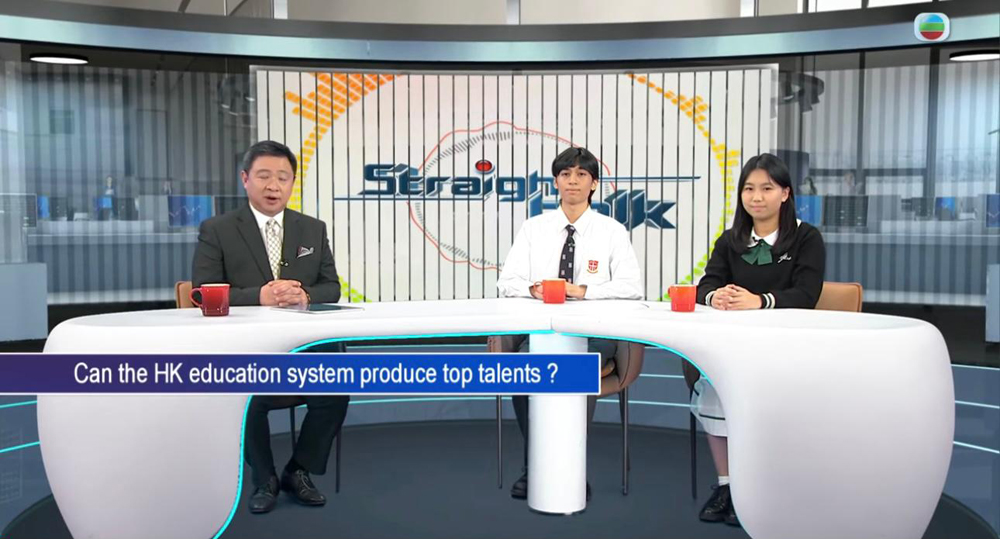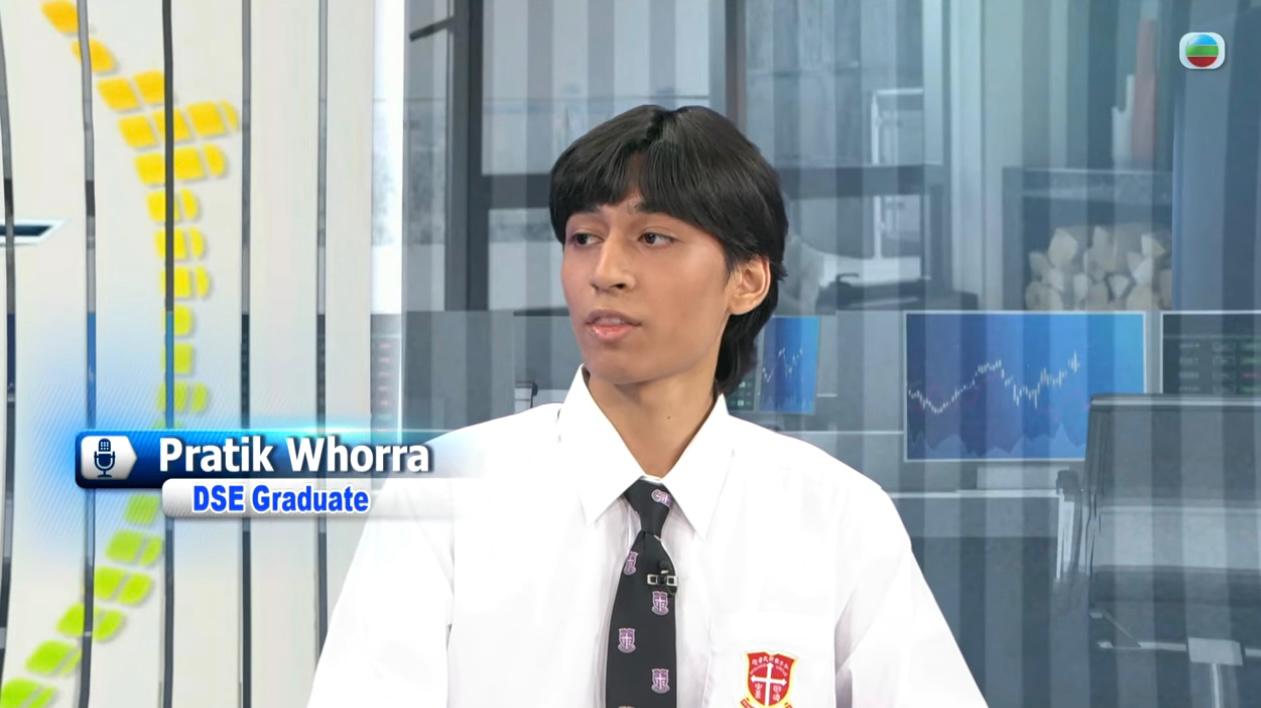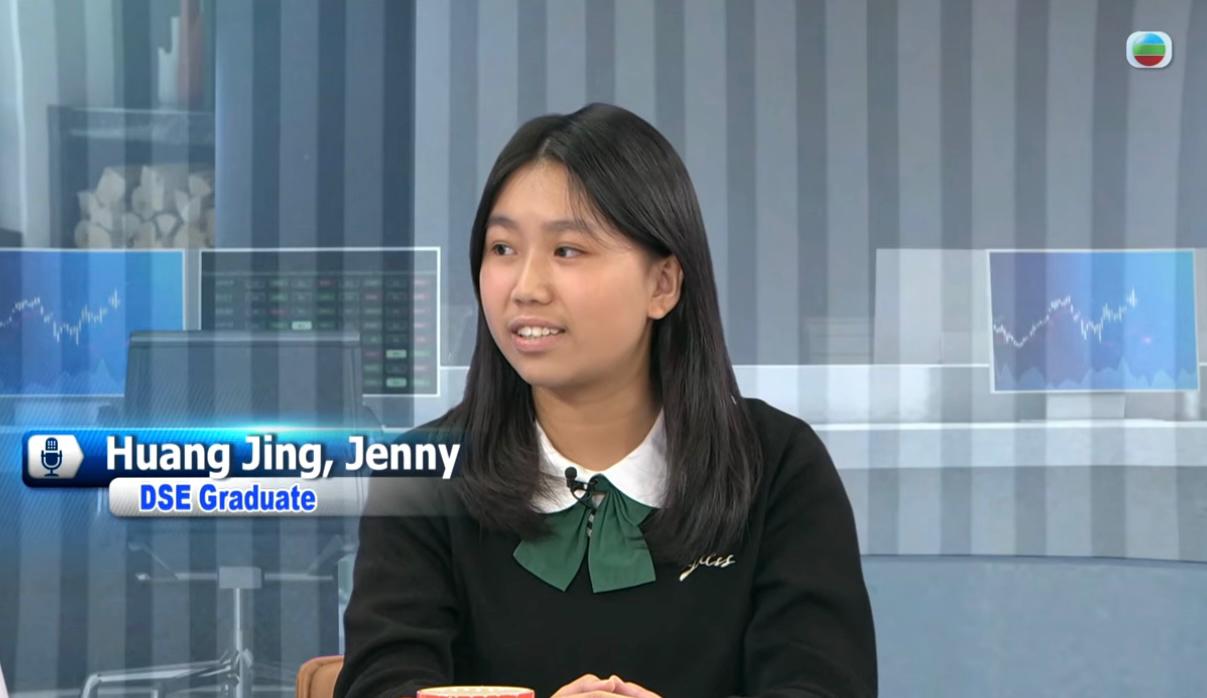
In our Diploma of Secondary Education exam results special, Straight Talk has invited recent graduates to the show.
In the first of our two-week special, Pratik Whorra and Jenny Huang, who have achieved very high marks, shared how they managed to get such great results, their future plan and their take on the education system in Hong Kong.
Check out the full transcript of TVB’s Straight Talk host Dr Eugene Chan’s interview with the DSE graduates:
Chan: Good evening! I'm Eugene Chan and welcome to Straight Talk. This evening we begin a two-part series of recent DSE graduates sharing their experiences and insights in Hong Kong's education system. In this episode, we will focus on the challenges faced by non-Chinese speaking students and recent immigrants from the Chinese mainland in navigating different cultures and systems, and an emphasis in education. Let's welcome our guests: on the left is Pratik Whorra and on the right is Jenny Huang.
Welcome, Jenny, and welcome Pratik! Maybe just to get us warmed up ... I know it's your first time on television, maybe Pratik you can start by introducing yourself.
Whorra: I'm Pratik Whorra from Newman Catholic College, just finished my DSE results and I'm really relieved that I managed to get satisfactory results.
Chan: Wow. Relieved. You should be happy to get very good results. And Jenny?
Huang: Thank you, Dr Chan! I'm Huang Jing Jenny and I'm from the ELCHK Yuen Long Lutheran Secondary School and I prepared to the best of my ability in DSE, but the result is far more better than my expectations. So, I'm really happy with it.
Chan: Right. So, Pratik, maybe you can start by telling us, you were satisfied with the results. So how good are they or how satisfied are you?
Whorra: Well, it's good enough for me to get into university, so that's great. But there's still room for improvement. But overall, pretty happy, and my parents are happy, of course.
Chan: Has it gone better than you expected?

Whorra: No, it's around what I expected.
Chan: So very predictable. And Jenny, how did you go?
Huang: So, the results fulfil the requirements of my dream university program, and I know that there's still room for me to keep improving, but the results are far better than I expected.
Chan: So, which subject did you find most difficult, Pratik?
Whorra: Probably Chinese.
Chan: Right, I'm sure.
Whorra: Next up would probably be physics which I struggled with.
Chan: And yourself?
Huang: I think chemistry, because I'm not really like ... can revise these kinds of equations of elements, so I find it very difficult.
Chan: Right. See, for most students, I mean, DSE is the ultimate test because this is what decides the next steps of your pathway, whether you go to university or which course you're doing. So, if I'm going to ask you what will be the biggest challenge that you find, say for Pratik, in preparing the last few years towards the exam?

Whorra: For the last few years, it was probably my Chinese of course, right? And it was only after... Thanks to my teachers and my parents. My teachers, especially my Chinese teacher, every day after school, she would just help me improve my Chinese and eventually I was able to get a pass in the GCSE.
Chan: And what were your biggest challenges, Jenny?
Huang: I think it is to keep a positive attitude towards adversity, because DSE is a very, like, competitive exam for me. So, I will be very pressured. So, the biggest challenge for me will be keeping a positive mindset towards the DSE.
Chan: How do you do that?
Huang: So, I always like true myself by going to drawing lessons because I like drawing.
Chan: Right, so that helped you to relieve your pressure. Are you nervous today?
Huang: Yes.
Chan: To come on television?
Huang: Definitely.
Chan: Yourself, Pratik?
Whorra: Very nervous.
Chan: Just relax because our viewers are very kind. They want to know more about the pathway you've been through and they want to learn more about you. Let's talk about your schooling. Pratik, I believe you're from a non-Chinese speaking background.
Whorra: Yes.
Chan: And you mentioned a couple of times already that Chinese has been difficult to you.
Whorra: Yes.
Chan: How did you manage to learn Chinese? Maybe I can come from a more empirical way.
Whorra: Well, this problem really started out in primary school and as the courses got harder, and I couldn't really learn Chinese at home that well because I just spoke English mainly. So, I could only learn it through school, but that was a huge struggle. And there were not many resources put into my primary school. But when I reached Newman Catholic College, and the teachers there were very supporting and very willing to help me after school. I stayed extra hours just to help me improve my Chinese.
Chan: I must say both your principal and vice principal are here today with you.
Whorra: Yes.

Chan: They show their support they have for you. How long did it take you to get confident with the Chinese?
Whorra: I'm still not exactly confident, but maybe when I was in Form 4. By that time, I was able to be confident I could pass the GCSE.
Chan: Can you elaborate more about the language barrier, or the cultural difference that you find as a non-Chinese speaking student in our system?
Whorra: Well, obviously, Hong Kong is very accepting, culturally. Maybe when I was in the playground, I wouldn't have any trouble finding friends and at school, I can make friends really easily. And that's great about Hong Kong. I love that I'm able to make friends with anyone and talk about anything, even if I'm from a different cultural background.
Chan: And Jenny. Maybe you could share with us your path. I believe I mean, you're originally from the mainland. You've been here since you were age 11, I think you've told me. So how do you find it to transition from the mainland system to the Hong Kong system?
Huang: I think it was quite smooth because the teachers and my family always give me support. For example, my secondary school always give me comprehensive support from both academics and also extra-curricular activities, which cultivates my academic results and also my leadership skills, and also allows me to explore my own future.
Chan: Did you get along well with your fellow students when you first came to Hong Kong?
Huang: Yes, they are very friendly. They greet me and also like, they help me to manage my homework and also tell me the format's that I should do, so it's okay, I think.
Chan: So Jenny, if I'm going to ask you, what will be the main differences between the mainland system and the Hong Kong system? Maybe you can share with the viewers?
Huang: I think the mainland system will be more exam-oriented than the Hong Kong system. So, it will be more competitive than Hong Kong?
Chan: Really?
Huang: Yes, definitely. Because the amount of population will be very large and the university's seats will be very limited. So, the competition will be even fiercer than in Hong Kong. And students would like to get a university seat or even a top tier university will be very tired and pressured under that kind of competitive environment.
Chan: In Hong Kong, we have five universities in the top 100. So, Hong Kong will be a very attractive place for mainland students.
Huang: Yes, definitely.
Chan: Pratik, I mean, I'm going to ask you a general question. What is your view of the education system in Hong Kong?
Whorra: Well, I think I'm very blessed to be able to be part of it. Because looking at my future education pathway. It's very broad, I could go anywhere abroad. I've had many options. Even if my DSE results weren't quite satisfactory, I would have many paths to take. And I think that's amazing.
Chan: One common comment that we get from viewers is that Hong Kong's education system is very, I won't use the word, pressurized, I will use heavy emphasis on rote learning and exam-oriented teaching methods. So, do you think this affects the overall student performance because you'll have to cater for the exams? Pratik?
Whorra: I would generally agree with that. Two major points from primary school to secondary school and also the transition from secondary to university, these two points are, there's really a ton of pressure right? Your parents want you to do well of course, they want you to get into a good secondary school because you’re thinking of … and then even more so in the DSE, which really decides your future career.
Chan: And Jenny. He has talked about that part so, how about the actual real-life application? I mean, we always try to learn things that you’re going to apply in daily life. Do you find the Hong Kong education system has that element enough for that?
Huang: I think it has, but it maybe not enough because the syllabus or the curriculum is like fixed, so students may not really think outside of their textbooks and apply the knowledge into daily lives. However, I think, in Hong Kong's education system, the textbook is already like it's close to the factual life, so students can actually apply the knowledge to their reality. But however, it may not be really enough.

Chan: Jenny, is there anything that you would suggest to our officials from our Education Bureau to do ways to help many students to better settle in the Hong Kong system? Is there anything that you can suggest in terms of support?
Huang: I think that you have to have trust in your ability. So, I received support from my school and my family, so I know that I have the ability to do so and I have a trust in myself and I can be more brave or I can be more eager to embrace the unknown future. So, that's why I can adapt to Hong Kong's education system quickly. So, my suggestion will be that you have to trust in yourself.
Chan: Trust in yourself. Pratik, anything that you think our officials can help better for non-Chinese speaking students to be better suited?
Whorra: Well, actually I agree greatly with her point. And it's something that I struggle a lot to accomplish as well is to have sort of confidence in myself and my own ability to improve, because besides Chinese my other subjects weren't really doing too well as well. When I first entered secondary school, in fact, I think on my maths test, I got 20 marks …
Chan: Out of?
Whorra: … out of 100. And, and in the DSE I've managed to get, you know, good results in maths which is ...
Chan: How good was it?
Whorra: I got 5*.
Chan: Wow, okay. You should be very pleased.
Whorra: And that's really thanks to my maths teacher. He would be really harsh on me, but he was serving a tough love kind of way. And he would make me, if I did something wrong if I didn't give in my homework, he would always be angry at me and yes …
Chan: Alright, let's take a short break now. And viewers, we will be right back.
Chan: Welcome back! We have been exploring the question: can the Hong Kong education system produce top talents? And we’re doing that with recent graduates of the HKDSE examination. We have Pratik Whorra and Jenny Huang with us this evening, who have been sharing with us their results from the DSE, and the challenges they have faced. So, in the first part, you have told us physics was the tough one that you find, right? And what was the subject that you find difficult again?
Huang: Chemistry.
Chan: Chemistry, right. Will you be doing Chemistry in your future?
Huang: No.
Chan: No?
Huang: Yes because I find the equation and the elements and the definition very difficult to memorize, and I cannot really understand. So, that is why I think I am not suitable to study Chemistry.
Chan: So, Pratik?
Whorra: I am not going to be studying physics at all, never want to touch it again.
Chan: Really? And what will be your plan? What will be your life plan?
Whorra: Well, the subject that I am going to be studying is computer science. And the great thing about computer science is that there is many career options I have, and many different fields I can take. And it is getting increasingly important, especially now with AI (artificial intelligence).
Chan: How do you plan to achieve your goals of being actually in the computer business?
Whorra: Well, I think I think it is important by studying of course, and studying maybe not just what they teach in university, but other things as well, that would be useful for jobs and stuff.
Chan: Have you have any preferred university that you would like to go to?
Whorra: I would love to go to the University of Hong Kong.
Chan: Right. Do you think your grades will be good enough for that?
Whorra: I think so.
Chan: Congratulations.
Whorra: Thank you.
Chan: Right, and Jenny? What will be your ambition?
Huang: I would like to be an urban planner. So, in my school, I am lucky to have my principal as my mentor in the Individualized Career Counseling Program, and the University Dream Flyers program. So, he acted as my guide and gave me valuable advice to direct me to my dream of being an urban planner. So, I used to live in mainland, and now in Hong Kong. So, I see the difference between two cities, and know that culture and history and policies will be the determining factors to construct a city. So, I would like to pursue professional knowledge in this field and contribute myself in making Hong Kong a more livable city, in terms of sustainable development and smart city.
Chan: Will you make Hong Kong home?
Huang: Yes, definitely.
Chan: So, both of you, I have noticed, I am sure the viewers would have picked up by now, both of you are very grateful to your teachers and to your parents, actually your father is outside waiting for us as well.
Whorra: Yes.
Chan: So, what would you say to your father right now?
Whorra: I would say that I love him and I thank you for all the years he has taken care of me, and he was very worried about me, always keeping contact with my teachers, worried about my results. And I hope that he is happy and relieved that I got good results to enter university.
Chan: Right. Yourself?
Huang: So, I would talk to my teachers, I would tell them I am very thankful to all the contribution they made to me. They always gave me comprehensive support and encouragement, so that I can explore my possibilities in secondary school. And also they placed trust in me, so they appointed me to be the head prefect in the school. So, I can learn some essential soft skills from this kind of student leader role, and I can also overcome my stage fright by giving speech in public. So, that is why I am very thankful to them.
Chan: Right. How will you repay their kindness to you? Tell them in public, what will you say to them today?
Huang: I would say thank you because I think words cannot really express my gratitude, so I would like to thank them for giving support to me and give me encouragement, and giving me chances to try everything that I want to try. So, they gave me this kind of chances, so I can explore my abilities and embrace a new future.
Chan: I am sure you would continue to go back to the school and help your junior students, won’t you?
Huang: Definitely, yes.
Chan: That is something very important. So, you know you are now on the Straight Talk program, that we always ask direct questions. Now comes the hard part, I appreciate your honest answer. Some people say to me that the social ladder in Hong Kong is broken, that means it is very difficult for one who is actually from the lower social class to move up, even to the middle or even the higher class? That means the rich will become … still remains rich, and the poor will be very hard to break their barrier. Do you think that is the correct statement? Jenny?
Huang: I partly agree with that. I think because Hong Kong people’s income is very divided, so rich people, they get high income, and they get richer; and poor people, they can only sustain their lives, they cannot really like have more money to get in the next social class. But however, poor people can achieve high level of income by studying. So, they can pay effort to get some … for example, university seat, so they can have a higher income later on. So, it is really possible for them to change their social class.
Chan: Right. So, you are confident about your own future?
Huang: Yes, definitely.
Chan: Right. Pratik, what do you think? Do you think Hong Kong is a very difficult place to move on?
Whorra: Not really. I think personally I had a great experience self-studying, especially now with the computer technology, the internet. You can basically learn anything you want. And I think that really bridges the social gap. And as well as for funding, I myself had applied for a book grant, so the government would pay for my books and supplies. And even now going to university, I can apply for grant for my school. And that is incredible, and I am really grateful for that.
Chan: Let’s move onto something more forward thinking, forward looking. The Hong Kong education system is often also criticized, apart from the rote learning and being also exam-oriented, is the lack of emphasis on creativity and critical thinking. Pratik, do you agree?
Whorra: Somewhat, but I think that now they are trying to change and trying to improve because recently I know that they have changed the syllabus for the form lower than me. And I think they are trying to improve and going to a better direction.
Chan: Jenny, there is also … I think I asked you earlier in the show that there is a lack of emphasis on the practical skills and vocational education. Do you think that by learning, going through all these years leading to DSE, if say for those people who may not have the opportunity to continue to study, do you think they are equipped to survive in our community?
Huang: I think they can survive in the community, however, they may not be able to pursue their dreams. So, the kind of soft skills will be very essential and very crucial for our society. Leadership or some kind of career planning would be very crucial in secondary school. However, Hong Kong’s education system may not require students to do this kind of thing, only require students to get a high mark in exams and memorize all the things in textbooks. So, it may be a lack of emphasis on this kind of soft skills, so students may feel difficult when they enter workplace because they did not equip themselves with this kind of soft skills.
Chan: Right. Pratik, I mean you are going to do computer science, and I am going to ask you a very direct question. How can our system better incorporate technology and digital literacy skills to prepare the students for the modern world? Are we doing enough?
Whorra: No, but going with what I said before, like with the recent changes, I am already seeing that in the grouping there is more stuff with programming related. I saw that now the younger students are learning Python and all the more useful programming languages, and I think that is a step in a good direction.
Chan: So, Jenny, we are coming to the … nearly the end part of the show. What would you want to say to the fellow students who will be doing DSE next year?
Huang: I think it is that you have to keep good mindset to yourself and trusting yourself because DSE is an exam that you have to perform good in the exam. However, if you cannot like have the courage to face it or you did not trust in yourself, you are not confident to do so, so you might not be able to perform that good in the exam setting. So, you may feel nervous, but you have to cope with the nervousness. That is why I think, you have to trust yourself.
Chan: Trust yourself.
Huang: Yes.
Chan: Just now our producer and I, we all felt that you are very relaxed. And being coming over to Hong Kong just less than 10 years, your English is fantastic.
Huang: Thank you.
Chan: How do you achieve that?
Huang: So by practice, practice makes perfect always.
Chan: How do you practice?
Huang: I do listening. I listen to the recordings or news or some kind of radio, and I try to jot notes about it. And then I would try to repeat what they say to practice my accent. So, that is why I can speak English fluently now, not really fluently, but it is okay. That is why I think students can practice more by writing or listening to native speakers.
Chan: Right. And Pratik, being a non-Chinese speaking originally, how would you advise our students to do well in this section?
Whorra: Well, I think making friends with local students, getting an opportunity to speak Chinese more, trying to speak Chinese whenever you can, and to never give up. That is a bit cliche to say, but you have to believe that no matter how difficult Chinese may be, that you should give it your all and don’t give up.
Chan: Right. Have you ever asked them to watch more of TVB? That may be a good idea?
Whorra: That may be a great idea.
Chan: All right. I am afraid that is all the time we have for now. And thank you Pratik and Jenny for sharing your experiences with us. The both of you are great examples of how Hong Kong’s education system can produce top talents. Have a good evening and see you next week!


